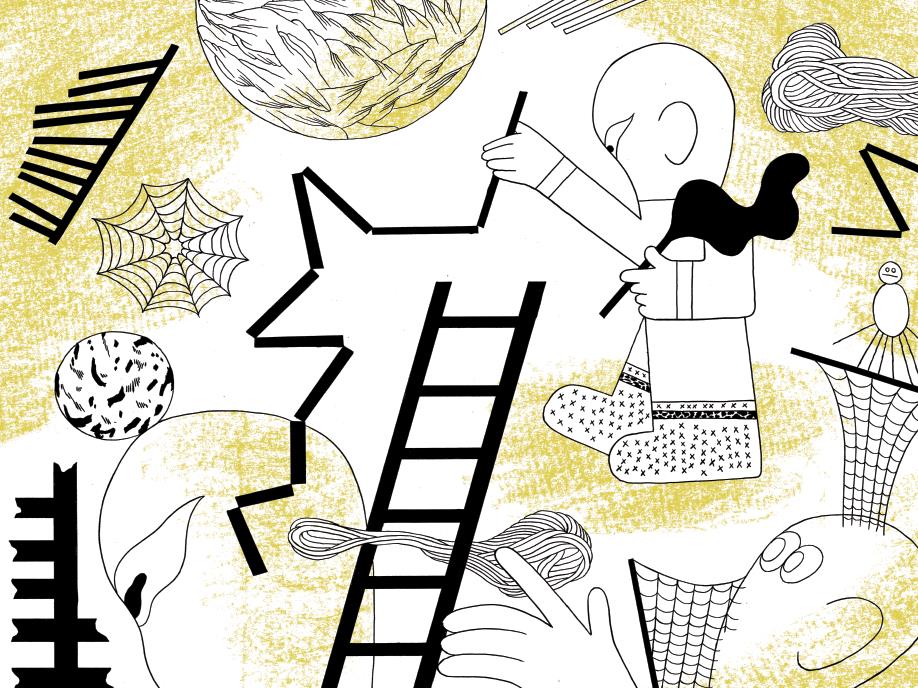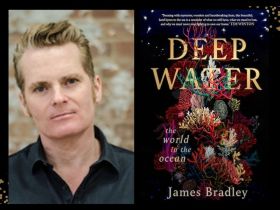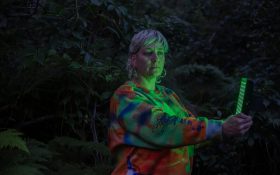Image by Patrick Black from Overland 215 Winter 2014.
Perhaps the most political in the raft of Australian literary journals – including the likes of Kill Your Darlings, Going Down Swinging, The Lifted Brow, Meanjin and Seizure – the openly Left-leaning Overland disseminates new and challenging ideas about politics and culture, participates in the fundamental debates of the day, espouses social justice, and provides a space for established writers as well as lesser known marginal voices to lend their insight on a range of issues. So says Overland’s mandate on its website, and the latest 215 Winter 2014 edition fulfils this mission statement on every front.
In ‘Mourning Democracy’, James Muldoon talks about the transformation that democracy is undergoing; from the closure of borders and the reduction in civil liberties to the increase in welfare restrictions and the deregulation of corporations – no doubt commenting on astringent asylum seeker policies and the recent cutbacks in the Federal Budget. If editor Jeff Sparrow’s prologue is pragmatic in its view that problems as well as possibilities must be acknowledged in the current political climate, Muldoon’s conclusion is an emboldening one that charts a way to the future for the embattled Left.
In another piece that overtly touches on the political challenges of the day, Anwyn Crawford hits back at critics of the Biennale of Sydney boycott and emphasises why such sustained forms of political action are so important. With a clear goal to get the Biennale to divest from Transfield – its major sponsor who invested in a $1.2 billion contract for offshore detention centres – Crawford says such a boycott was never going to end mandatory detention. But that was neither why it was done nor why it was eventually successful.
Regular Overland columnist Alison Croggon touches on the complex relationship between art and power by also referring to the biennale boycott in her article ‘On the Value of Art’. In Croggon’s view, the boycott very clearly demonstrated that there are values beyond financial self-interest as the artists withdrew their work and returned their commissions – harking back to the fact that artists work in one of the few occupations in the world where work is done with no certainty of economic reward.
The idea of getting paid for one’s work – a hot topic on the back of The Daily Review being boycotted by Crikey writers last year and the ‘Pay the Writers’ campaign‘ that has gained a groundswell of support – is touched on in deputy editor Jacinta Woodhead’s article ‘Hard for the Money’. Woodhead calls for minimum standards of payment and protection across the industry to stem exploitation, but cautions against reducing writing to a fee.
Part of Overland’s mandate is to provide a space for interesting voices from diverse and marginal backgrounds and 23-year-old Maddee Clark exemplifies this dedication in one of the most interesting non-fiction accounts in the journal. A queer indigenous person, Clark uses the reactions against Anthony Mundine’s homophobic remarks late last year as a springboard to question why such debates always give way to questions surrounding ‘legitimacy’ and ‘authenticity’. As Clark observes, the reactions against Mundine were less concerned with critiquing his claim than questioning his validity to speak on issues of tradition. Clark deviates halfway through to critique erroneous representations of queerness as ‘imported or white behaviour’ which in turn give way to narrow readings of culture and transforms indigenous sexuality into ‘a battleground for white morality’.
If Clark’s piece is the most illuminating of the non-fiction, Madeleine Hamilton’s ‘A Process of Survival’ is the most disturbing. Prompted to examine the mandatory incarceration of troubled young girls after her half-sister is remanded in the Melbourne-based Winlaton Youth Training Centre, Hamilton shines a light on to the darkest years of the facility in the 1970s and 1980s. She exposes the derelict conditions many institutionalised girls were forced to live in; the danger of mixing seasoned adolescent criminal offenders with young girls who were deemed at risk of neglect and abuse at home; the senselessness of ostensibly punishing girls who had been sexually abused by incarcerating them; and the subsequent harm the place wrought onto its forced occupants despite the best intentions of people who headed the facility.
The fiction in the journal is equally arresting. In conjunction with Overland’s 60-year anniversary, Tara Cartland reimagines Katharine Susannah Prichard’s story ‘Josephina Anna Maria’ that was initially published in the journal in June 1958. The result is an affecting account of a single mother’s relationship with her daughter and the menacing yet oddly comforting onset of lizards in the house. Fikret Pajalic’s ‘Boonie’ is captivating from the outset as it details two co-workers’ cathartic affair as they both seek something from the other that was never meant to be.
The poetry typifies the political orientation of Overland, with ‘Borderlines’ by Jenni Nixon and Ann De Hugard’s ‘After the Riot’ constituting direct responses to the government’s inhumane Pacific Solution. Illustrations pepper the journal throughout – some providing visual commentary to the features accompanying them, others providing stunning, occasional comedic reprieve from the slew of words in the journal.
Always a thought-provoking curation of works, the strength of the latest Overland edition – and dare I say each of its editions – lies in its ability to foster important discussions on the political challenges of the day while dedicating space to enduring, systemic injustices that will never go away unless we keep highlighting they exist and devising ways in which they can be eradicated.
Rating: 4 out of 5 stars
Overland #215 Winter 2014
Edited by Jeff Sparrow
Published by O L Society Limited
Paperback, 96pp, RRP $19.95





